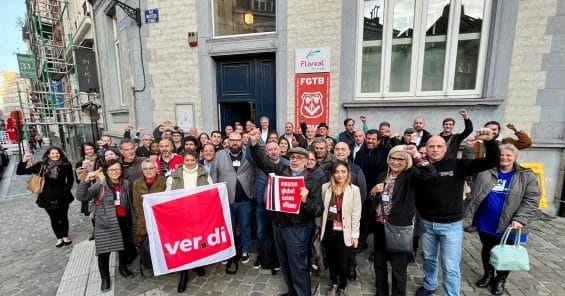UNI Global Union General Secretary Christy Hoffman and Head of UNI Property Services Eddy Stam joined private security officers in Doha this week to learn first-hand about the impact recent changes to labour law—such as the end of the kafala system—are having on the lives of Qatar’s migrant workers.
Coming from some of the world’s poorest countries, including Nepal and Bangladesh, and working in sectors including construction, hospitality, security, maintenance, cleaning and domestic service, over two million migrant workers make up nearly 90 per cent of Qatar’s labour force.
The decision to hold the FIFA World Cup in Qatar in 2022 triggered a global outcry about the conditions of workers and resulted in a 2017 technical agreement with the International Labour Organization (ILO). The resulting major reforms came from years of pressure on Qatar from the global labour movement, led by the International Trade Union Confederation (ITUC) and human rights advocates.
“UNI will continue working to ensure that the commitments of the new legal framework become a reality. Among other things, these changes allow workers to raise grievances and further strengthen the commitment to free movement for workers,” said Christy Hoffman, General Secretary of UNI Global Union. “We are hearing from migrant workers that these changes are welcome, and they will have a positive impact for many. But enforcement remains a challenge, and private employers must do their part. Recruitment agencies still unlawfully require payments from workers, and security officers are not always truly free to change jobs as they desire.”
In discussions with workers, the need for additional reform was made clear.
“When I came here from Kenya six months ago, I paid a big fee to get this job, and it’s not what I expected. I’m working twelve hours a day, and I hardly ever get a day off–maybe only once or twice a month. The living conditions are still crowded, with eight or nine people sharing one room. I hope we can get some improvements,” said Daniel.*
“I have worked in Qatar for over six years as a guard. Over the years, I have seen some small improvement in conditions for the many security officers joining me here. We used to earn about 900 Qatari Riyals (USD $240), but now that I have been promoted, I am earning slightly more (about 1,200 Qatari Riyals, or USD$330) per month. I hope that the laws will be implemented, and we will benefit from our services,” said Peter,* who works in a security company.
While in Doha, UNI’s Hoffman and Stam met with the Qatari Assistant Undersecretary for Labour Affairs and ILO representative Houtan Homayounpour to discuss the big steps taken and the leaps ahead. “It’s an honour and a challenge to be part of this process of reforms,” said UNI’s Eddy Stam.
Under the kafala system, employees were not allowed to change jobs or leave the country without employer approval. In 2018, the country’s Council of Ministers adopted legislation to allow workers, including millions of migrant workers, to change jobs freely.
In January 2020, the 2018 law was expanded to cover workers who were originally excluded and to specifically ban the “No Objection Certificates” previously required from employers before a worker could change jobs. In addition, the Council of Ministers endorsed a new law to establish a non-discriminatory, evidence-based minimum wage, the first of its kind in the Gulf States.
UNI is currently promoting workplace education on the issues facing the growing private security industry in Qatar.
“We are building a network of security workers and worker committees, which advise, register and process grievances through the Qatari authorities. We also bring security guards together to understand their rights under the new laws,” said Head of Property Services Stam.
For over two years, UNI Global Union has been part of bi-annual meetings between Global Union Federations, the ILO and the Qatari Ministry of Labour (ADLSA), allowing UNI to participate and help guide and monitor the progress of the labour reforms.
With only 313,000 citizens, Qatar’s swift modernization has depended on over 2.3 million foreign workers, mostly from Asian and African countries, who worked under the kafala system. Largely due to the 2022 FIFA World Cup and the rise of the tourism sector, the number of migrant workers has exploded in recent years to fulfil the country’s constant need for rapid construction.
As champions and promoters of social dialogue, UNI will continue to support the process of labour reforms, to the benefit of migrant workers in the state of Qatar.
*The workers named have asked to use a pseudonym.


